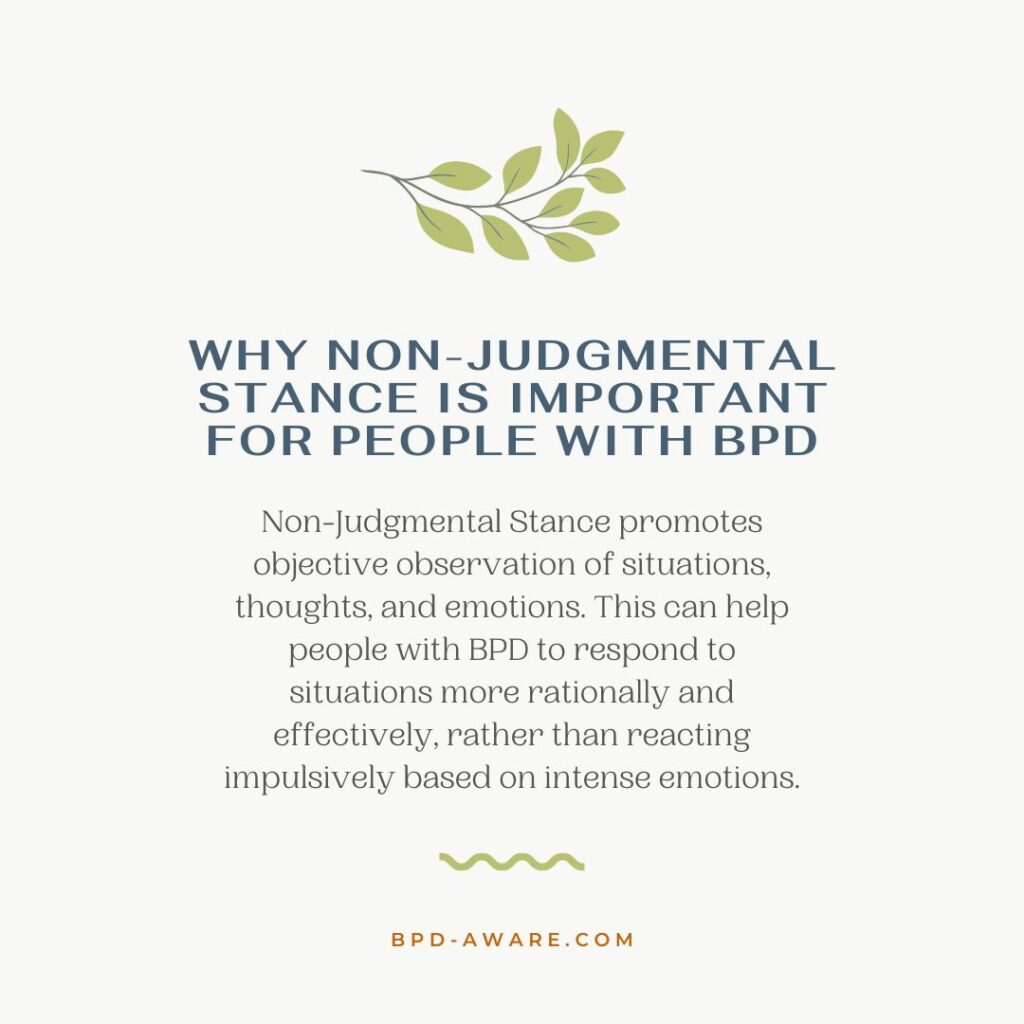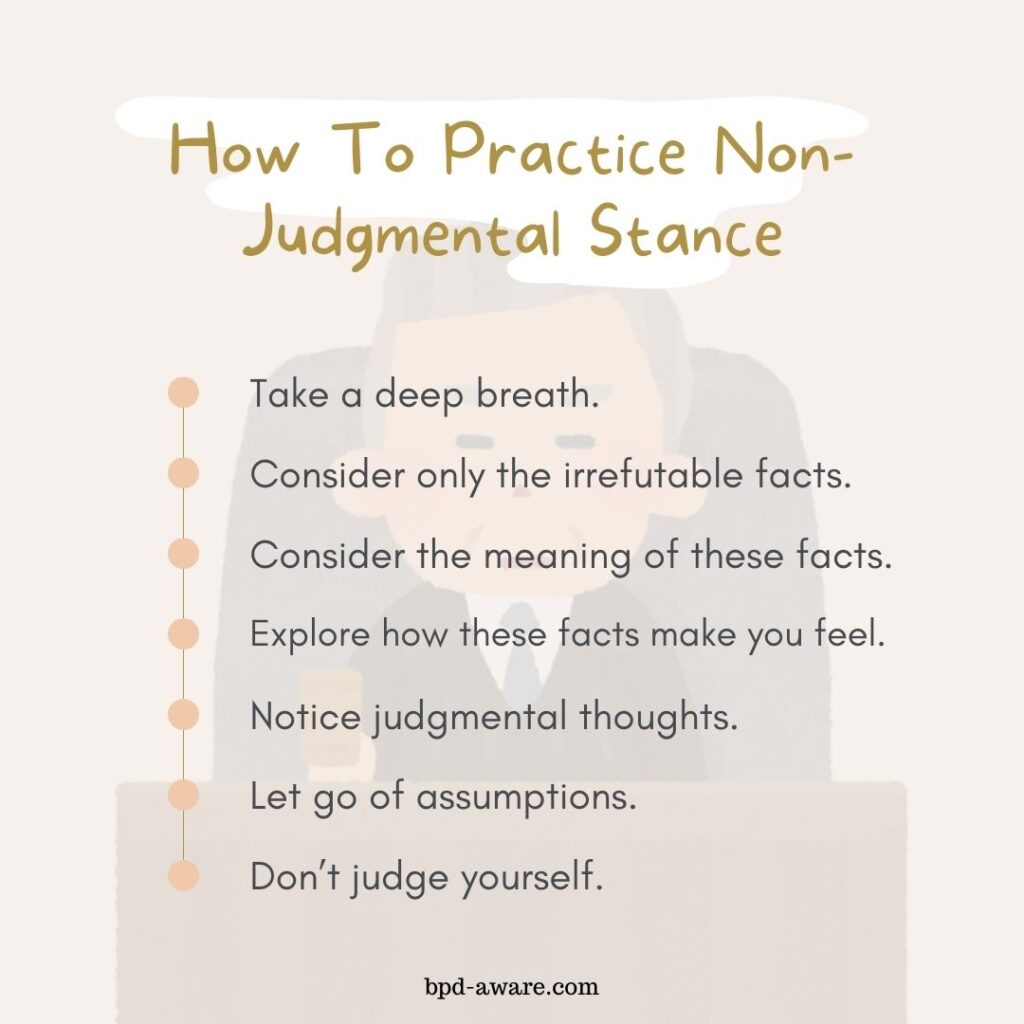Dialectical Behavior Therapy (DBT) consists of four cores: Mindfulness, Distress Tolerance, Emotional Regulation, and Interpersonal Effectiveness. Each of these cores provides a way to better cope with the symptoms of Borderline Personality Disorder (BPD) and how severely those symptoms affect you.
Today we’re going to be looking at one of the skills within the mindfulness core. Mindfulness is defined by three distinct components: Non-Judgmentally, One-Mindfully, and Effectively. We will be diving into the Non-Judgmentally component of mindfulness through the use of the DBT Skill known as Non-Judgmental Stance.
Learning the Non-Judgmental Stance is useful for people with BPD as it helps them to observe their thoughts, feelings, and behavior without labeling them as good or bad. It can also be useful when interacting with, or even just thinking about, other people as extreme judgment can lead to splitting.
What Does It Mean To Be Judgmental?
Most judgments that people make are based on personal preferences. Personal preferences tend to be based on past experiences, certain genetic factors, social interactions, cultural backgrounds, consumed media, and lifetime conditioning.
Let’s take a pair of pink high-heeled shoes and use it as an example. One person might look at those shoes and judge them to be one of the most beautiful, well-crafted pairs of shoes they’ve ever seen. Someone else might judge them to be impractical and over-priced. The same item can elicit two very different judgments.
The problem emerges when people forget that their judgments on things aren’t facts, they’re preferences based on biases they’ve built up throughout their lives. And passing judgment on something happens so spontaneously that most people aren’t even aware they’re doing it. It’s as natural as breathing. The mind quickly passes information through the filters someone has built up over their life and decides whether something is good or bad.
Everyone does this and everyone needs to be wary of it, but this is particularly true for people with BPD. Borderline Personality Disorder often causes black-or-white thinking that creates extreme judgment on various things, people, or situations. This judgment might not just be a case of good or bad, it can be as extreme as perfect or evil. This is particularly true during times of intense stress or emotional distress.
To reduce extreme emotional reactivity, it’s vital to accept that your judgments are based almost exclusively on your own personal preferences and that your judgments aren’t facts.

The Impact of Judgments
In our earlier example, we used a pair of pink high-heeled shoes to show how an item can be judged very differently by two different types of people. The result of those two judgments would likely be that the person who liked the shoes wants to buy them, while the person who didn’t like them would avoid them. Either result isn’t too important in the grand scheme of things. Someone gets something they want, someone doesn’t get something they don’t like.
However, when these judgments are made on more important issues, particularly by someone prone to extreme thinking, the consequences can be much more devastating. Let’s say someone with BPD messages a friend and then doesn’t hear back from them for a couple of hours.
Neurotypical people might assume their friend is busy. The person with BPD might judge that their friend hasn’t responded because they hate them and don’t want to talk to them ever again. The result of this judgment could be that the person with BPD spirals into a serious crisis and bombards their friend with a series of emotional messages. The irony being that the relationship was absolutely fine until the bombardment of messages was sent.
Practicing Non-Judgmental Stance
Non-Judgmental Stance is something that you can do often. Whenever a situation arises that provokes an emotional response is a good time to practice Non-Judgmental Stance. This could be a personal situation or you could use news items as a way of gaining further practice.
Consider the following things when practicing Non-Judgmental Stance:
Take a deep breath. Taking a couple of slow, deep breaths can help to relax and slow down your mind. This, in turn, can help reduce the emotional response to the situation.
Consider the facts. What are the stone-cold, irrefutable facts of a situation? Focus purely on what was actually said and what you saw. Avoid attaching positive or negative attributes to any of the observations.
Consider the consequences. Consider the consequences or meaning of these irrefutable facts. Don’t color them with judgment at this stage, stick to the facts of the matter.
Explore your feelings. Now allow yourself to explore your feelings and emotional responses to these facts. Don’t judge yourself negatively or positively for these feelings, just allow them to be. You might also want to consider where these feelings come from. Could your emotional response be related to something in your past?
Notice judgmental thoughts. Pick your judgments apart and separate them away from the facts. Pay particular notice of extreme words like “never”, “always”, “awful”, “great”, and “beautiful”. Recognize that these are words of judgment and let them go.
Let go of assumptions. People have many gifts, mind-reading is not one of them. Let go of any belief that you know what someone else is thinking, feeling, or intending at any moment. All you can do is observe their actions and listen to what they say.
Don’t judge yourself. As you practice Non-Judgmental Stance and improve your skills in this area, you will still catch yourself engaging in judgmental thinking. This is completely normal and natural. Don’t judge yourself harshly for judgmental thinking, just take a mental note of it and work your way back into non-judgmental thinking.

Final Thoughts
By practicing and integrating Non-Judgmental Stance into your life, you become more aware of your emotional reactions and the extreme paths they can lead you down if you let them. While a certain amount of judgmental thinking will always exist, when you learn to recognize this and how your judgments are based, your emotional reactions will begin to lessen.
This reduction in emotional volatility will provide you with greater control over your life.
Like all DBT Skills, Non-Judgemental Stance works best when it is practiced often. It will be tough at first and might feel unnatural. This is normal. With repeat practice, it will become easier and can eventually become second nature.
If you have any questions or experiences using Non-Judgmental Stance, we’d love to hear from you either in the comments section below or over in our BPD forums.
Sources, Resources, and Further Reading:
- Embracing the Power of DBT Non-Judgemental Stance: A Path to Emotional Freedom: https://counselingcentergroup.com/dbt-non-judgemental-stance/
- Exercises For Non-judgmental Thinking: https://psychcentral.com/blog/dbt/2010/06/exercises-for-non-judgmental-thinking#1
- Letting Go of Judgments: https://dialecticalbehaviortherapy.com/mindfulness/letting-go/
- Understanding How Judgments Can Affect You: https://hxworks.com/insights/understanding-how-judgments-can-affect-you/
















